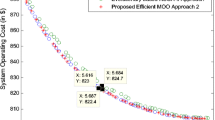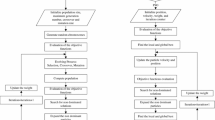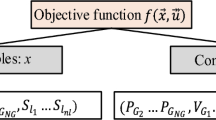Abstract
A hybrid population-based metaheuristic, Hybrid Canonical Differential Evolutionary Particle Swarm Optimization (hC-DEEPSO), is applied to solve Security Constrained Optimal Power Flow (SCOPF) problems. Despite the inherent difficulties of tackling these real-world problems, they must be solved several times a day taking into account operation and security conditions. A combination of the C-DEEPSO metaheuristic coupled with a multipoint search operator is proposed to better exploit the search space in the vicinity of the best solution found so far by the current population in the first stages of the search process. A simple diversity mechanism is also applied to avoid premature convergence and to escape from local optima. A experimental design is devised to fine-tune the parameters of the proposed algorithm for each instance of the SCOPF problem. The effectiveness of the proposed hC-DEEPSO is tested on the IEEE 57-bus, IEEE 118-bus and IEEE 300-bus standard systems. The numerical results obtained by hC-DEEPSO are compared with other evolutionary methods reported in the literature to prove the potential and capability of the proposed hC-DEEPSO for solving the SCOPF at acceptable economical and technical levels.










Similar content being viewed by others
References
Frank S, Steponavice I, Rebennack S (2012) Optimal power flow: a bibliographic survey (I) - formulations and deterministic methods. Energy Syst Springer 3:221–258
Frank S, Steponavice I, Rebennack S (2012) Optimal power flow: a bibliographic survey II: non-deterministic an hybrid methods. Energy Syst Springer 3:259–289
Bhaskar M, Muthyala S, Maheswarapu S (2010) Security Constraint Optimal Power Flow (SCOPF) - a compreensive Suvery. Int J Comput Appl 2(6):42–52
Carpertier J (1962) Contribution to the economic dispatch problem. Bull Soc Fr Electri 8(3):431–447
Phan D, Kalagnanam J (2014) Some Efficient Optimization Methods for Solving the Security-Constrained Optimal Power Flow Problem, vol 29
Ela A, Abido M, Spea A (2010) Optimal power flow using differential evolution algorithm. Electric Power Syst Res 80:878–885
Suharto MN, Hassan MY, Majid MS, Abdullah MP, Hussin F (2011) Optimal Power Flow Solution Using Evolutionary Computation Techniques. In: Proceedings of the IEEE Region 10 Conference TENCON, vol 1, pp 1–8
Abido M, Ali N (2012) Multi-objective Optimal Power Flow Using Differential Evolution. Arab J Sci Eng 37(4):991–1005
Liang JJ, Mao XB, Qu BY, Niu B, Chen TJ (2012) Elite Multi-Group differential evolution. WCCI 2012 IEEE world congress on computational intelligence
Kang Q, Zhou M, An J, Wu Q (2013) Swarm intelligence approaches to optimal power flow problem with distributed generator failures in power networks. IEEE Trans Autom Sci Eng 10:343–353
Dixit S, Srivastava L, Agnihotri G (2014) Minimization of power loss and voltage deviation by SVC placement using GA. Int J Control Autom 7(6):95–108
Radosavljevic J, Klimenta D, Jevtic M, Arsic N (2015) Optimal Power Flow Using a Hybrid Optimization Algorithm of Particle Swarm Optimization and Gravitational Search Algorithm. Electric Power Components Syst 00(00):1–13
Shaheen A, El-Sehiemy R, Farrag S (2016) Solving multi-objective optimal power flow problem via forced initialised differential evolution algorithm. Transm Distrib 10(7):1634–1647
Nakawiro W, Erlich I (2009) A Combined GA-ANN Strategy for Solving Optimal Power FLow with Voltage Security Constraint. In: Proceedings of the Asia-Pacific Power and Energy Engineering Conference
Phan D, Kalagmanam J (2014) Some efficient optimization methods for solving the Security-Contrained optimal power flow problem. IEEE Trans Power Syst 29(2):863–872
Zhang R, Dong ZY, Xu Y, Wong KP, Lai M (2014) Hybrid computation of corrective security-constrained optimal power flow problems. IET Gener Transm Distrib 8(6):995–1006
Carvalho L, Loureiro F, Sumali J, Keko H, Miranda V, Marcelino C, Wanner E (2015) Statistical tuning of DEEPSO soft constraints in the security constrained optimal power flow problem. In: Proceedings of the 18th International Conference on Intelligent System Application to Power Systems, vol 1, pp 1–7
Marcelino C, Almeida P, Wanner E, Carvalho L, Miranda V (2016) Fundamentals of the c-DEEPSO Algorithm and its Aplication to the Reactive Power Optimization of Wind Farms. In: Proceedings of the IEEE Congress on Evolutionary Computation. vol 1, pp:
Pham H, Rueda J, Erlich I (2014) Online Optimal control or Reactive sources in Wind Power Plants. IEEE Trans Sustaina Energy 5(2):608–616
Teeparthi K, Kumar DM (2017) Multi-objective hybrid PSO-APO algorithm based security constrained optimal power flow with wind and thermal generators. Engineering Science and Technology, an International Journal, acepted March, pp 2–16
Raju CP, Vaisakh K, Raju SS (2009) An IPM-EPSO based hybrid method for security enhancement unsing SSSC. Int J Recent Trends Eng 2(5):208–2012
Kumari M, Maheswarapu S (2010) Enhaced genetic algotithm based computation technique for multi-objective optimal power flow solution. Int J Electr Power Energy Syst 32(6):736–742
Chung CY, Liang CH, Wong KP, Duan XZ (2010) Hybrid algorithmm of Differentialial evolution and evolutionary programming for optimal reactive power flow. IET Gener Transm Distrib 4(1):84–93
Radosavljevic J, Arsic N, Jevitic M (2014) Optimal Power Flow Using Hybrid PSOGSA Algorithm. In: Proceedings of the 55th International Scientific Conference on Power and Electrical Engineering of Riga Technical University (RTUCON)
Zeng Y, Sun Y (2012) Comparasion of multiobjecive particle swarm optimization and evolutionary algorithms for optimal reactive power dispatch problem. In: Proceedings of the IEEE Congress on Evolutionary Computation. vol 1, pp 258–265
Shi L, Wnag C, Yao L, Yixin N, Bazargan M (2012) Optimal power flow solution incorporating wind power. IEEE Syst J 6(2):233–241
Srivastava L, Singh H (2015) Hybrid multi-swarm particle swarm opitimisation based multi-objective reactive power. IET Gener Transm Distrib 9(8):727–739
Bai W, Eke I, Lee K (2015) Heuristic optimization for wind energy integrated optimal power flow. In: Proceedings of the IEEE Power & Energy Society General Meeting. vol 1, 1–5
Baumann M, Marcelino C, Peter J, Wanner E, Weil M, Almeida P (2017) Environmental impacts of different battery technologies in renewable hybrid micro grid systems. In: IEEE PES Conference europe (ISGT-europe) innovative smart grid technologies
Xiang Y, Peng Y, Zhong Y, Chen Z, Lu X, Zhong X (2014) A particle swarm inspired multi-elitist artificial bee colony algorithm for real-parameter optimization. Comput Optim Appl 57:493–516
Zellagui M, Abdelaziz A (2015) Optimal Coordination of Directional Overcurrent Relays using Hybrid PSO-DE Algorithm. Int Electr Eng J (IEEJ) 6(4):1841–1849
Vaisakh K, Praveena P, Rao R, Meah K (2012) Solving dynamic economic dispatch problem with security constraints using bacterial foraging PSO-DE algorithm. Electr Power Energy Syst 39:56–67
Xin B, Chen J, Zhang J, Fang H, Peng Z-H (2012) Hybridizing differential evolution and particle swarm optimization to design powerful optimizers: A review and taxonomy. IEEE Transactions on Systems Man and Cybernetics: applications and reviews 42(5):1–24
Miranda V, Alves R (2013) Differential evolutionary particle swarm optimization (DEEPSO): a successful hybrid. In Proceedings of the 11th Brazilian Congress on Computational Intelligence (BRICS-CCI), pp 368–374
Price K, Storn R, Lampinen J (2005) Differential evolution- a pratical aprooach to global Optimization. Springer, Berlin
Zhang J, Sanderson A (2009) JADE: Adaptative Differential Evolution with optional external archive. IEEE Trans Evol Comput 13(5):945–958
Tamura K, Yasuda K (2011) Primary study of spiral ddynamic inspired optimization. IEEJ Trans Electr Eletron Eng 6(S1):S98–S100
Benasla L, Belmadani A, Rahli M (2014) Spiral Optimization Algorihm for solving Combined Economic and Emission Dispatch. Electr Power Energy Syst 62:163–174
Tamura K, Yasuda K (2011) Spiral dynamics inspired optimmization. J Adv Comput Intell Inform 15(8):1116–1122
Krasnogor N, Smith J (2005) A tutorial for competent memetic algorithms Model, taxonomy and design issues. IEEE Trans Evol Comput 9(5):474–488
Pant M, Thangaraj R, Grosan C, Abraham A (2011) Hybrid Differential Evolution - Particle Swarm Optimization algorithm for Solving Global Optimization Problems. In: Proceedings of the 3Th International Conference on Digital Information Management, pp 18–24
Erlich I, Lee K, Rueda J, Wildenhues S (2014) Competition on application of modern heuristic optimization algorithms for solving optimal power flow problems. In: Technical report, working group on modern heuristic optimization, intelligent systems subcommittee power system analysis, Computing, and Economic Committee
Montgomery D (2012) Design and analysis of Experiments. 8th edition
Niu M, Jia Y, Xu Z, Wong KP (2014) Differential Evolution Algorithm with a Modified Archiving-based Adaptive Tradeoff Model for Optimal Power Flow. Technical report, avaible: https://www.uni-due.de/imperia/md/content/ieee-wgmho/icde.pdf, https://www.uni-due.de/imperia/md/content/ieee-wgmho/panel.pdf
Acknowledgements
The authors would like to thank CEFET-MG, ITAS and INESC TEC for the infrastructure used by this project and also CAPES, CNPq and FAPEMIG for the financial support. This work is financed by the BE MUNDUS Project, the Helmholtz-Project Energy System 2050.
Author information
Authors and Affiliations
Corresponding author
Rights and permissions
About this article
Cite this article
Marcelino, C.G., Almeida, P.E.M., Wanner, E.F. et al. Solving security constrained optimal power flow problems: a hybrid evolutionary approach. Appl Intell 48, 3672–3690 (2018). https://doi.org/10.1007/s10489-018-1167-5
Published:
Issue Date:
DOI: https://doi.org/10.1007/s10489-018-1167-5




